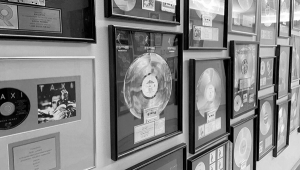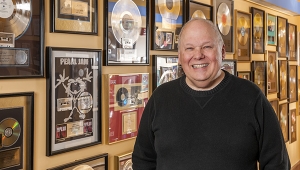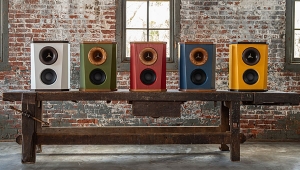| Columns Retired Columns & Blogs |
The Music Goes Round & Round Page 3
Riendau: And you will then hear people say "I think you should use a clamp, as the inside of the record really sounds bad!"
Brennan: The problem with many reviews is that they don't tell me what I'm going to get in terms of extra satisfaction from my music. The description should make people interested in learning more about that product. People will buy a magazine that has articles that express confidence in good products and say that it's really a good idea to have a good hi-fi system. I remember when it was first discovered that turntables affected sound quality—the fact that a turntable could increase the enjoyment of records was actually exciting to read about. But the descriptions of the turntables in a review like AHC's don't get people excited. The way the VPI is described is a complete irrelevance.
Riendau: The things coming out of reviews are pretty crazy sometimes. People comment and they can't back up their comments with substance. But basically these goddamn reviews do sell turntables.
Tiefenbrun: People who read magazines are looking for clues . . .
Brennan: . . . and the only people they can trust are the magazines.
Riendau: OK, VPI has a great review. Let's turn the page, make the review black instead. What do you think will happen with Mr. Weisfeld? Tomorrow he'll pack up and look for a new job. That's what happens with these kinds of reviews. That's the danger. We let the journalists get involved with our product and they decide whether or not tomorrow we should look for a new job. How can we defend ourselves?
Brennan: The only thing you can do is work with the dealers and make sure that the dealer does give the public a chance to hear things.
Riendau: But the public, once they read that, they don't want to get a chance.
Tiefenbrun: "Let the buyer beware" is the first rule of trading. I always say to customers, "Look, the manufacturer might give you your money back, the retailer might do so, but the magazine won't give you your money back." That implies power without any responsibility! I think the editorial people have the responsibility of seeing that the magazine doesn't say things that are damaging, and for making sure that what they're saying is true.
Atkinson: A cynic could say that here you all are, representing a certain kind of product under threat from the Japanese companies, who are totally into selling CD. Of course you want to accentuate the positive; you don't want a divisive review because you need to reinforce people's belief that listening to records, not listening to numbers, is what it is all about.
Brennan: Listening to records is a perfectly legitimate thing. For music lovers it's still the only way to approach an awful lot of music which is not available on CD. People have a huge investment in software and they haven't actually got to tap it yet.
Herman: We've actually come to the reason why we are all in business—to play records. Records are events of music that excite people, and if we can provide them with more access to that excitement, then we're making good products and the marketplace will respond. Everyone will have his own taste in music, his own appreciation of what it is about music that turns him on, and if we're making it available to him, that's what's important. If we're talking about different technologies, then what we're here for is to try to make people understand that reviews do not represent the manufacturers of turntables as people who see themselves as an extension of the entertainment industry; that music starts the chain, and music ends the chain. Turntables are appliances that try to get as much back out of the groove as possible, and hopefully, therefore, as much enjoyment as is available.
Tiefenbrun: I think you can make it awful complicated, and get very lyrical about bits of black plastic. The point is, surely, that you've got to remember why you got into the business and what your objective is. There are lots of people out there that have lots of records; if they had a better turntable, they would get a lot more pleasure out of their existing record collection. And they would bring music into their lives.
Now I think that's what the hi-fi industry is all about, bringing more music, better music, into people's homes. It's not a substitute for live music, but hopefully a good system will broaden people's taste and encourage an interest in live music, and make the world a slightly better place. I think it's a worthwhile thing to do. But unfortunately—inevitably, seeing as we're all human beings—the hi-fi industry ends up being about the hi-fi industry. Doctors aren't about curing sick people, they're about the medicine business, and the media is about the media.
- Log in or register to post comments




































